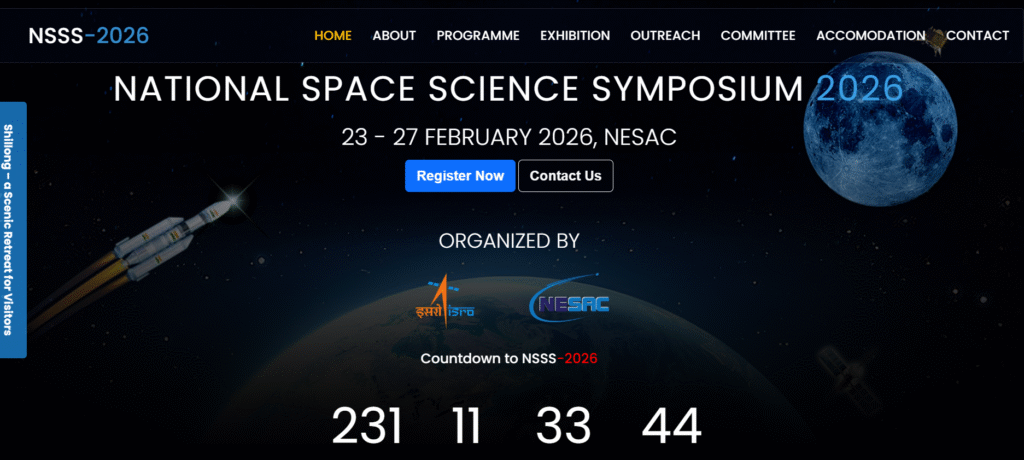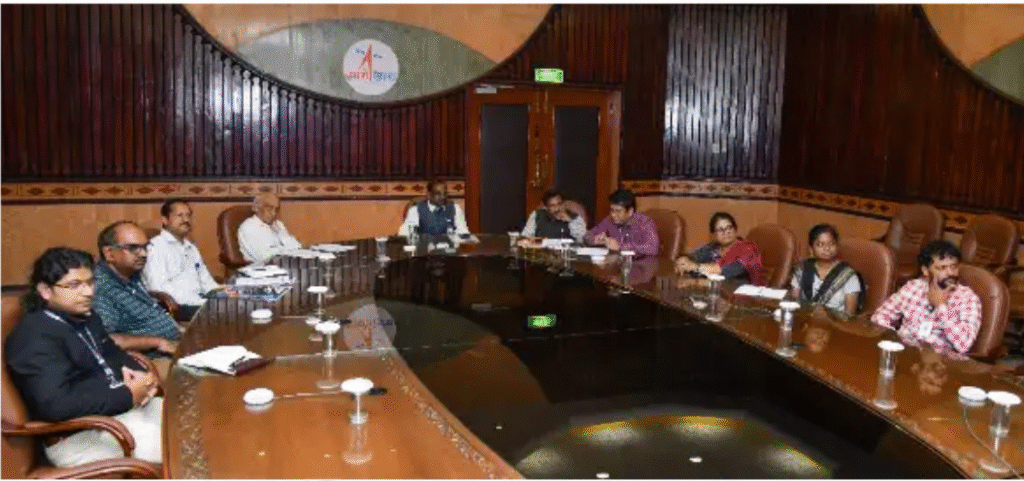India’s space science community is poised for an exceptional gathering as the Indian Space Research Organisation (ISRO) announces the 23rd National Space Science Symposium NSSS-2026, scheduled to take place from February 23-27, 2026, at the prestigious North East Space Applications Centre (NESAC) in Umiam, Meghalaya.

This biennial (which happens every two years) flagship event represents a significant milestone in India’s space science journey, bringing together researchers, scientists, and students from across the nation to explore the frontiers of space exploration and technology.
A Legacy of Excellence in Space Science
The National Space Science Symposium has established itself as the premier scientific platform for space research in India since its inception in 1978 at Andhra University, Visakhapatnam.

Originally evolved from the Indian Rocket Society Symposium and initially known as the INCOSPAR Symposium, the event has undergone a remarkable transformation over the decades, expanding its scope from specific rocket science to encompass all aspects of space science, from ground-based studies to space-borne observations covering everything from Earth’s surface to the cosmos.
The symposium’s evolution reflects India’s growing prowess in space technology and exploration. Under the visionary leadership of pioneers like Dr. Kasturirangan, the event successfully integrated astronomy and astrophysics communities into a comprehensive platform, making it truly representative of India’s diverse space science capabilities.
The 2026 Symposium: A New Chapter in Northeast India
The selection of NESAC as the host venue for NSSS-2026 holds special significance, marking only the second time that the Northeast region will host this prestigious event. Located in Umiam, approximately 20 kilometers from Shillong, Meghalaya, NESAC serves as a joint initiative between the Department of Space and the North Eastern Council, established in September 2000 to promote space science and technology applications in the northeastern states of India.
Dr. S.P. Aggarwal, Director of NESAC, expressed the center’s privilege in hosting this significant event, emphasizing their commitment to making it a record-breaking symposium in terms of registered delegates and overall standards.
The venue’s state-of-the-art facilities, including modern GIS software capabilities, advanced workstations, and comprehensive research infrastructure, make it ideally suited for hosting such a prestigious gathering.
Six Thematic Sessions: Exploring the Cosmos
NSSS-2026 will feature six parallel scientific sessions covering diverse themes in space science and technology.
- Space-Based Meteorology, Oceanography, Geosphere-Biosphere Interactions, and Climate Change – This session will explore how space-based observations contribute to understanding Earth’s complex climate systems and environmental changes.
- Middle Atmosphere, Atmospheric Coupling, Dynamics, Aeronomy, and Sun-Earth Connection – Focusing on the intricate relationships between solar activity and Earth’s atmospheric phenomena.
- Solar and Planetary Sciences – Examining our solar system’s bodies and their characteristics, building on recent successes like India’s Mars Orbiter Mission and lunar explorations.
- Astronomy and Astrophysics – Covering stellar, galactic, and extragalactic phenomena, reflecting India’s growing contributions to understanding the universe.
- Enabling Technologies for Space Exploration – Showcasing technological innovations that make space missions possible and more efficient.
- Student Session – A dedicated platform for fostering young scientific minds and encouraging the next generation of space scientists.
India’s Space Science Achievements: Setting the Stage
The timing of NSSS-2026 is particularly significant, coming on the heels of India’s remarkable achievements in space exploration. The successful completion of Aditya-L1, India’s first solar mission, which reached the L1 Lagrange point in January 2024, demonstrated the nation’s growing capabilities in deep space exploration.
This mission, positioned 1.5 million kilometers from Earth, provides continuous observation of the Sun, offering unprecedented insights into solar dynamics and space weather.
India’s space program has achieved numerous milestones in recent years, including the successful launch of XPoSat in January 2024, making India the second country globally to launch an X-ray polarimetry mission. These achievements underscore the relevance and importance of platforms like NSSS-2026 for sharing scientific knowledge and fostering collaboration.
Vision 2047: Ambitious Goals and Future Exploration
The symposium takes place against the backdrop of India’s ambitious Space Vision 2047, which targets establishing the Bharatiya Antariksh Station (BAS) by 2035 and achieving an Indian crewed lunar mission by 2040.
This vision includes four major projects: Gaganyaan follow-on missions, development of Next Generation Launch Vehicles (NGLV), Chandrayaan-4 for lunar sample return, and the Venus Orbiter Mission scheduled for 2028.
These ambitious goals reflect India’s commitment to becoming a major space-faring nation and highlight the critical role that scientific forums like NSSS-2026 play in advancing research and development in space sciences.
Comprehensive Program Structure
The symposium’s structure reflects its commitment to comprehensive scientific discourse. The event will comprise plenary sessions featuring keynote addresses from leading experts, public lectures designed to engage the broader community, oral and poster presentations across technical parallel sessions, and a dedicated student session aimed at nurturing young talent.
The inclusion of public lectures demonstrates ISRO’s commitment to science communication and public engagement, ensuring that the benefits of space research reach beyond the scientific community to inspire the general public, particularly students who represent the future of India’s space program.
Fostering International Collaboration
NSSS-2026 will serve as a crucial platform for fostering international collaboration in space sciences. The symposium provides opportunities for Indian researchers to present their work, discuss scientific challenges, and explore collaborative possibilities with international partners.
This aspect is particularly important as space exploration increasingly becomes a global endeavor requiring international cooperation and knowledge sharing.
The event’s focus on emerging trends in space science and technology aligns with global developments in the field, ensuring that Indian space science research remains at the forefront of international scientific discourse.
Educational Impact and Outreach
The symposium’s commitment to education and outreach is evident in its comprehensive approach to engaging different segments of the scientific community. The dedicated student session provides a platform for young researchers to present their work and interact with established scientists, fostering mentorship opportunities and encouraging career development in space sciences.
ISRO’s broader educational initiatives, including programs like YUVIKA (Young Scientist Programme) and the Space Science and Technology Awareness Training (START) program, complement the symposium’s educational objectives. These programs work together to create a robust ecosystem for space science education and research in India.
Economic and Social Impact
The symposium’s economic and social impact extends beyond the scientific community. By bringing together researchers, industry representatives, and government officials, NSSS-2026 will facilitate technology transfer, innovation, and economic development in the space sector.
The event’s focus on practical applications of space technology ensures that research outcomes contribute to societal benefits, including improved weather forecasting, disaster management, and resource monitoring.
Research Presentation and Scientific Discourse
The symposium will feature approximately 600 poster presentations across four days, providing extensive opportunities for scientific exchange and discussion. These presentations will cover cutting-edge research in various domains of space science, from quantum technologies and space robotics to remote sensing and sustainable space exploration.
The oral presentation sessions will allow for in-depth discussions of significant research findings, fostering collaboration and identifying future research directions. The peer-review process for abstracts ensures that only Technological Innovation and Industry Participation.
NSSS-2026 will showcase technological innovations through exhibitions by industry participants and startups, celebrating the collaborative efforts driving India’s space science program forward. This industry participation reflects the growing commercialization of space activities and the increasing role of private sector engagement in India’s space ecosystem.
The symposium’s focus on enabling technologies for space exploration provides a platform for discussing emerging technologies such as artificial intelligence, machine learning, and advanced propulsion systems that are reshaping space exploration capabilities.
Networking and Professional Development
The symposium serves as an invaluable networking platform for professionals at all stages of their careers. Early-career researchers benefit from exposure to established scientists and opportunities to present their work. In contrast, senior researchers can identify potential collaborators and stay updated on emerging trends in their fields.
The residential nature of the symposium, with comprehensive accommodation arrangements and social activities, facilitates informal interactions that often lead to lasting professional relationships and collaborative research initiatives.
conclusion
The 23rd National Space Science Symposium represents more than just a scientific conference; it embodies India’s commitment to advancing space science research and education. As the country moves toward its ambitious Space Vision 2047 goals, events like NSSS-2026 play a crucial role in building the scientific foundation necessary for achieving these objectives.
The selection of NESAC as the host venue also highlights the importance of regional development in space science capabilities, ensuring that India’s space program benefits from diverse geographical and cultural perspectives. As participants gather in the scenic hills of Meghalaya in February 2026, they will not only advance scientific knowledge but also strengthen the bonds of collaboration that will drive India’s space science endeavors for years to come.
Thank you so much for reading! Glad you like it and found it helpful. Your support means a lot to me. Please share your thoughts in the comments below. Don’t forget to share this post with others who might enjoy it too!
